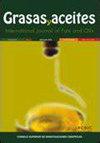土耳其东南部两个有机和常规栽培杏仁品种的化学、矿物和脂肪酸组成研究
IF 1.1
4区 农林科学
Q4 CHEMISTRY, APPLIED
引用次数: 3
摘要
有机农业是一种有利于人类和环境的生产系统,它以土壤肥力和食品安全为基础,在生产中不使用化肥和农药,旨在重新建立由于有害生产做法而恶化的生态平衡。有机产品吸引了消费者的兴趣,因为与传统食品相比,有机产品被强烈认为是更健康的产品。本研究旨在确定传统栽培和有机栽培的Ferragnes和Ferradore杏仁品种在化学、矿物和脂肪酸特性方面的差异。当从脂肪酸、接近成分和矿物质、原油和镁的角度评估传统和有机杏仁时,它们在统计学上不显著,而Cu显著(P<0.05),所有其他都非常显著(P<0.001)。与传统样品相比,两个品种的有机样品的总糖都更高。传统样品中的原油和亚油酸(Ferragnes为12.93%,Ferradore为14.99%)较高,但有机样品中的油酸(Ferragines为78.9%,Ferradole为81.08%)较高。此外,与传统样品相比,有机样品含有较高的Mg和Fe,但含有较低的P、K、Ca、Na、Zn、Mn和Cu。结果表明,与有机栽培的杏仁相比,传统栽培的杏仁具有更高的矿物质含量和更低的脂肪酸值。本文章由计算机程序翻译,如有差异,请以英文原文为准。
A research on the chemical, mineral and fatty acid compositions of two almond cultivars grown as organic and conventional in southeastern Turkey
Organic farming is a human and environment friendly production system that is based on soil fertility and food safety without using chemical fertilizers and pesticides in production, aiming to re-establish the deteriorated ecological balance as a result of harmful production practices. Organic products attract the interest of consumers as they are strongly perceived as healthier products compared to conventional food. This study aimed to determine the differences in chemical, mineral, and fatty acid characteristics between conventionally and organically cultivated Ferragnes and Ferraduel almond cultivars. When conventional and organic almonds were evaluated in terms of fatty acids, proximate compositions, and minerals, crude oil and Mg were statistically insignificant, while Cu was significant (P < 0.05) and all others were quite significant (P < 0.001). Total sugar was higher in organic samples compared to conventional samples in both cultivars. The crude oil and linoleic acid (12.93% for Ferragnes and 14.99% for Ferraduel) were higher in conventional samples but oleic acid (78.9% for Ferragnes and 81.08% for Ferraduel) was higher in organic samples. In addition, organic samples contained higher Mg and Fe but lower P, K, Ca, Na, Zn, Mn and Cu when compared with conventional samples. The results indicate that conventionally cultivated almonds present higher mineral content and lower fatty acid value compared to organically cultivated almonds.
求助全文
通过发布文献求助,成功后即可免费获取论文全文。
去求助
来源期刊

Grasas y Aceites
工程技术-食品科技
CiteScore
2.50
自引率
0.00%
发文量
50
审稿时长
3 months
期刊介绍:
Grasas y Aceites is a peer-reviewed journal devoted to the publication of original articles concerning the broad field of lipids, especially edible fats and oils from different origins, including non acyl lipids from microbial origin relevant to the food industry. It publishes full research articles, research notes, reviews as well as information on references, patents, and books.
Grasas y Aceites publishes original articles on basic or practical research, as well as review articles on lipid related topics in food science and technology, biology, (bio)chemistry, medical science, nutrition, (bio)technology, processing and engineering. Topics at the interface of basic research and applications are encouraged. Manuscripts related to by-products from the oil industry and the handling and treatment of the wastewaters are also welcomed.
Topics of special interest to Grasas y Aceites are:
-Lipid analysis, including sensory analysis
-Oleochemistry, including lipase modified lipids
-Biochemistry and molecular biology of lipids, including genetically modified oil crops and micro-organisms
-Lipids in health and disease, including functional foods and clinical studies
-Technical aspects of oil extraction and refining
-Processing and storage of oleaginous fruit, especially olive pickling
-Agricultural practices in oil crops, when affecting oil yield or quality
 求助内容:
求助内容: 应助结果提醒方式:
应助结果提醒方式:


